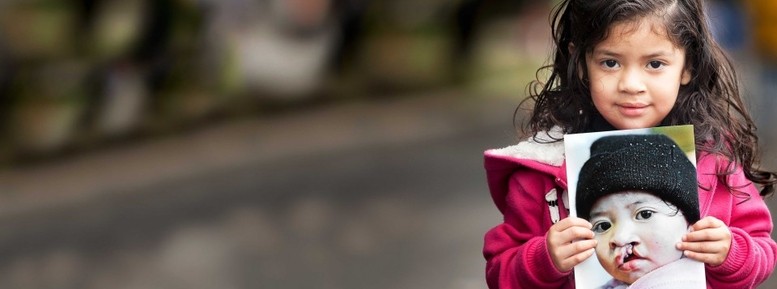By Geir Stangeland, Associate Chief Medical Officer, Operation Smile. This story was originally published on our Medium channel.

Our promise of improving health and dignity during the COVID-19 pandemic endures. We're helping front-line health workers stay safe, nourished and empowered to better serve their patients by providing life-saving supplies and equipment, as well as remote training to bolster their response. We’re also providing nutritional assistance, hygiene kits and virtual health services to support people and their health needs so they can thrive. If you can, when you can, help us keep our promise to care for children and create hope for tomorrow.
When this organization began, almost 40 years ago, we relied on skilled medical professionals who volunteered their time to travel to some of the most remote areas in the world to perform life-altering cleft surgery.
Since then, we have grown from that first medical mission in the Philippines to providing care for patients in more than 30 countries with volunteers from more than 60.

For the past year, I’ve collaborated with the medical oversight team to review and refine our Medical Global Standards© of care. Contributors to these standards included surgeons, anesthesiologists, pediatricians, dentists, nurses, psycho-social providers, speech language pathologists, and biomedical technicians from the countries where we deliver care.
These standards are a critical pillar in our response to the needs of patients and for strengthening health systems throughout the world’s medical communities. They reflect the diversity of care delivery and capacity building programs our teams of professionals have developed and implemented in the communities where we work.
Our Standards Ensure Patients Receive Complete Cleft Care
One thing that has been truly exciting throughout our growth as an organization is the way that we have developed a pool of volunteers in the countries where we work through the introduction of education and training for professionals. Currently, more than 80 percent of our missions are staffed by local volunteers.
Our organization has gone from the original model of mission-based, 10-day programs to a completeness of care and education model that is all-encompassing, longitudinal and multidisciplinary.
Our standards establish a programmatic approach for treating our patients. They ensure quality and safety from the first interaction we have with our patients and provide auditing and reviews of medical events to reduce post-operative incidents. They reflect our goal to provide sound multi-disciplinary care for patients born with cleft that includes dentistry, pediatrics and speech pathology.

Why Are We Updating Our Approach?
We developed our first set of care standards in 2006. They were subsequently revised in 2010 and once again in 2014. The updates we’ve made in 2020 continue to build on those early efforts to ensure safe, high quality, efficient care for every patient we serve worldwide.
This time we have a much broader focus, and hence a wider swath of contributors to this effort — professional focus groups, medical advisory councils, our medical directors, stakeholders at our U.S. headquarters and other individuals. Well over 200 individuals have contributed.

While we addressed surgical and anesthesia care in previous iterations, we now have incorporated all the professional disciplines that we provide to children born with a cleft lip and cleft palate. For the first time, nutrition, speech, pediatrics, dentistry and psychology have been included.
The policies also cover special needs in programs that have grown out of our traditional mission model, such as education, visiting professorships, cooperation with other organizations and, not least, the establishment of year-round centers of care.
This document reflects our firmly held belief that all professions count in a completeness of care. That is why we depended upon our professional “focus groups” to give their input. We understand that many professions are needed to get the best results for patients. We require that:
- A safe and appropriate facility for delivery of surgical care includes a clean environment, a consistently adequate supply of water and electricity, adequate lighting, electrical outlets and a secure, environmentally controlled space for storage of equipment and pharmaceuticals.
- All medical and non-medical volunteers are current and in good standing according to specialty qualifications and volunteer management.
- Medical equipment, supplies and pharmaceutical supplies are sourced from reputable manufacturers and distributors.
- Medical screening and patient assessment that includes measuring vital signs, oxygen saturation, weight, and height and processing needed laboratory analyses.

An All-Encompassing Approach to Delivery Surgery Safely
Our Medical Global Standards© are one of three major components of Operation Smile’s principles for treating patients with integrity and respect.
The first is our strict code of conduct that provides ethical and integrity-based guidance for all constituents on topics related to organizational governance, human resources, child protection, medical quality and fiscal management.
The second, our patient’s rights declaration, is the basis for what we believe is the protection of personal and private information that every patient, regardless of geographic location, should expect from and be provided by care givers.
In my view, the Medical Global Standards© are the most important of the three. They designate how all care and treatment should be provided at the patient level on a world-wide basis. The ideal of safe surgery is one that must be pursued in cooperation with others and shared among health care professionals of all medical disciplines. It is our vision for the levels of performance in care that must be consistently and uniformly delivered to all patients.

About the author: As Associate Chief Medical Examiner with Operation Smile, Geir Stangeland is responsible for the medical surveillance of all Operation Smile activities, programs, education and volunteer qualifications and needs, as well as quality assurance and improvement. He was initially attracted to the organization by the fact that we provide free health care to patients, and especially children, born with cleft lip or cleft palate where quality care is not readily available.
Latest Stories

Beyond Surgery: Inspiring Moments with Operation Smile in Peru

Meet Camila and Mateo and Their Moms

